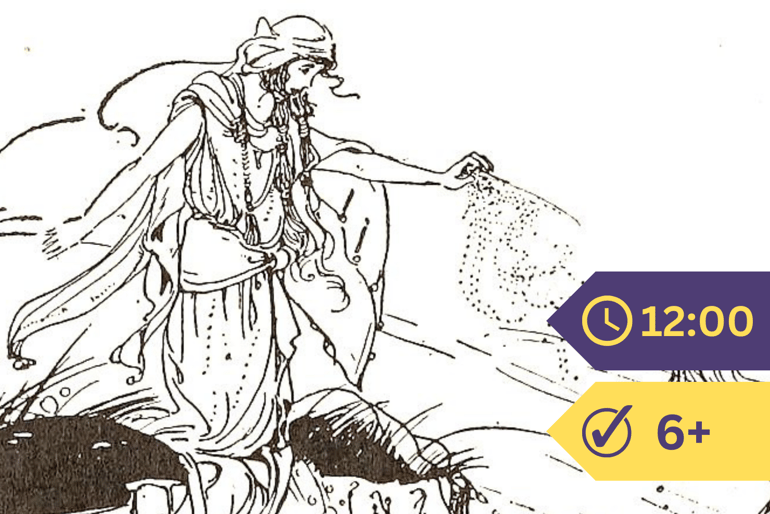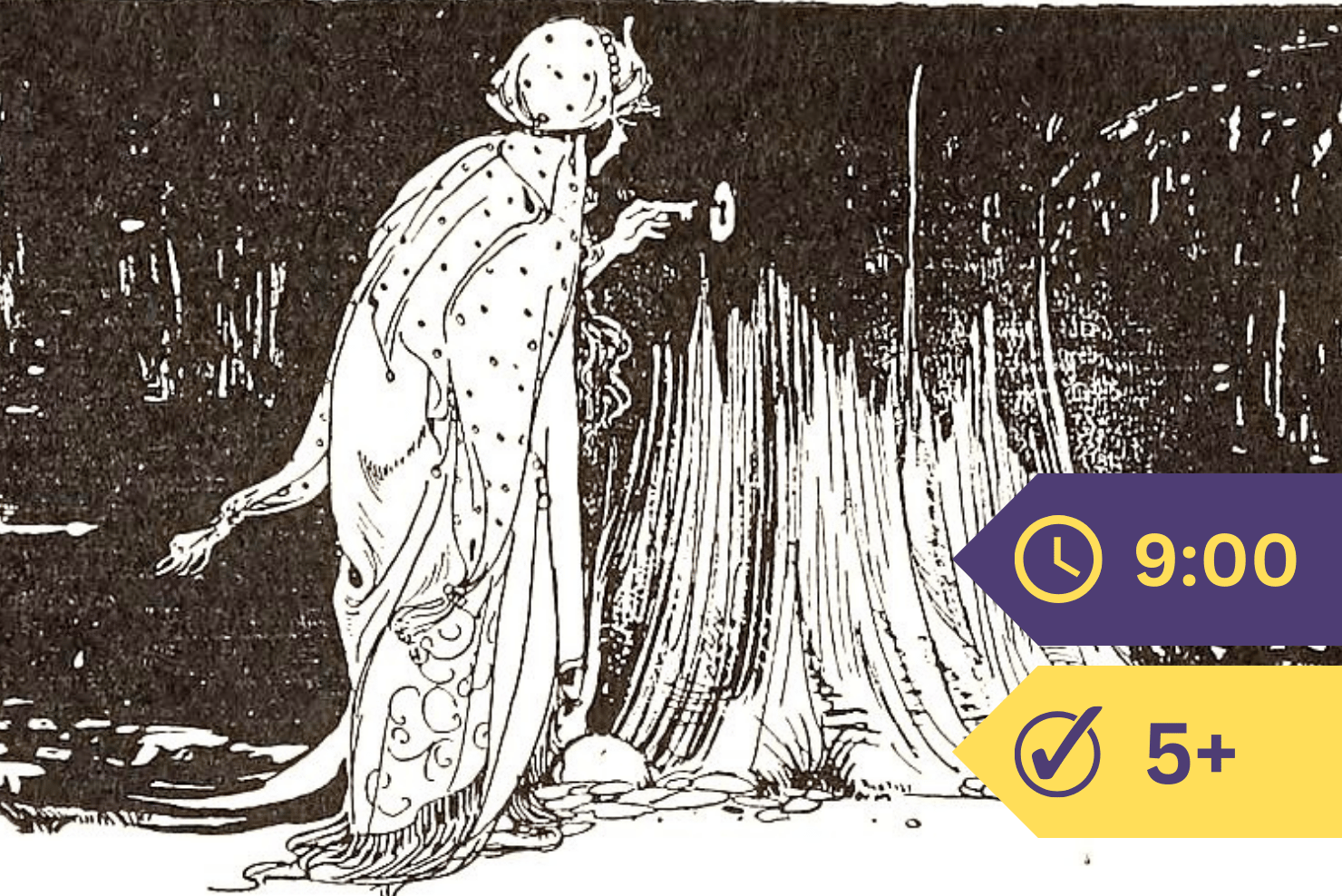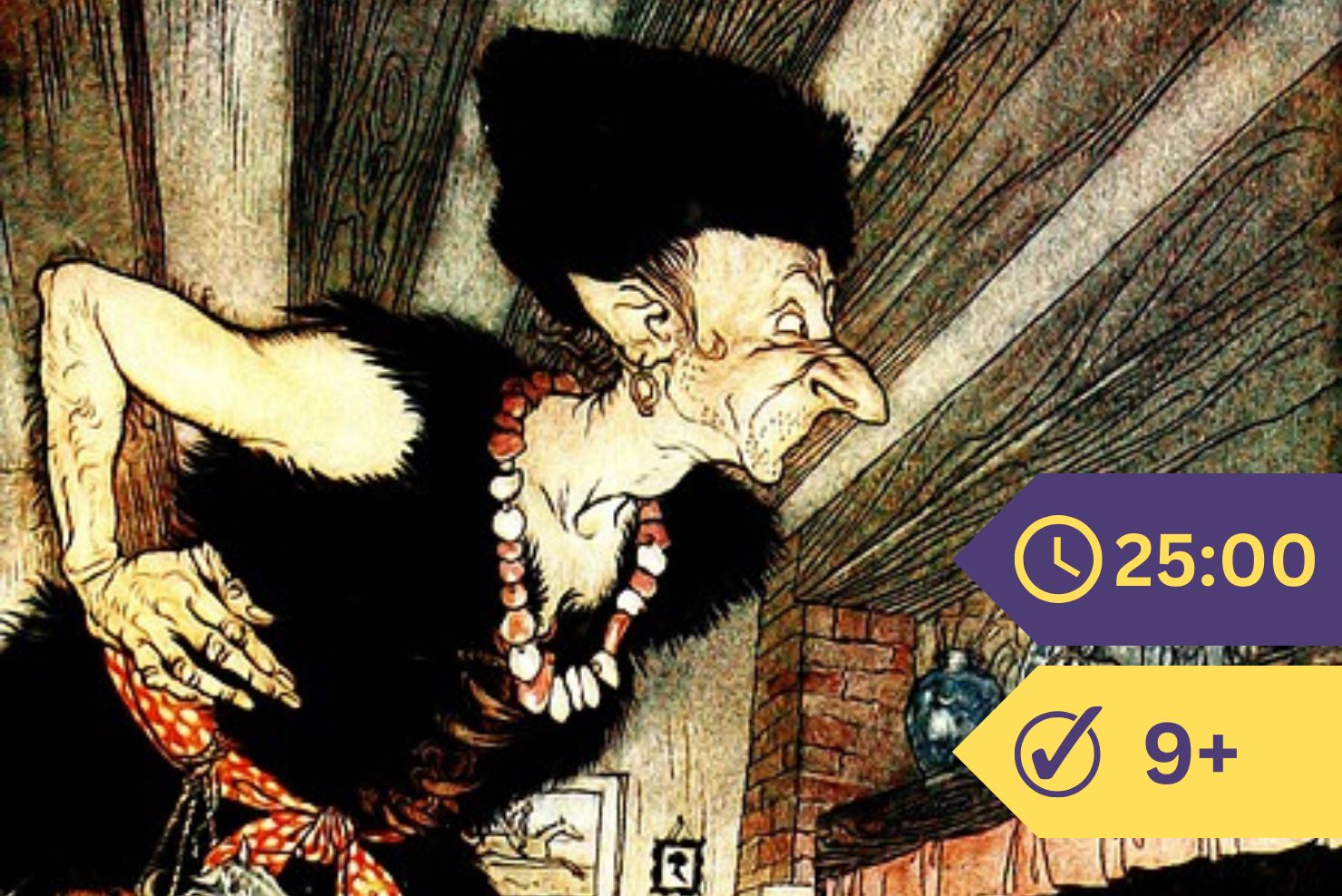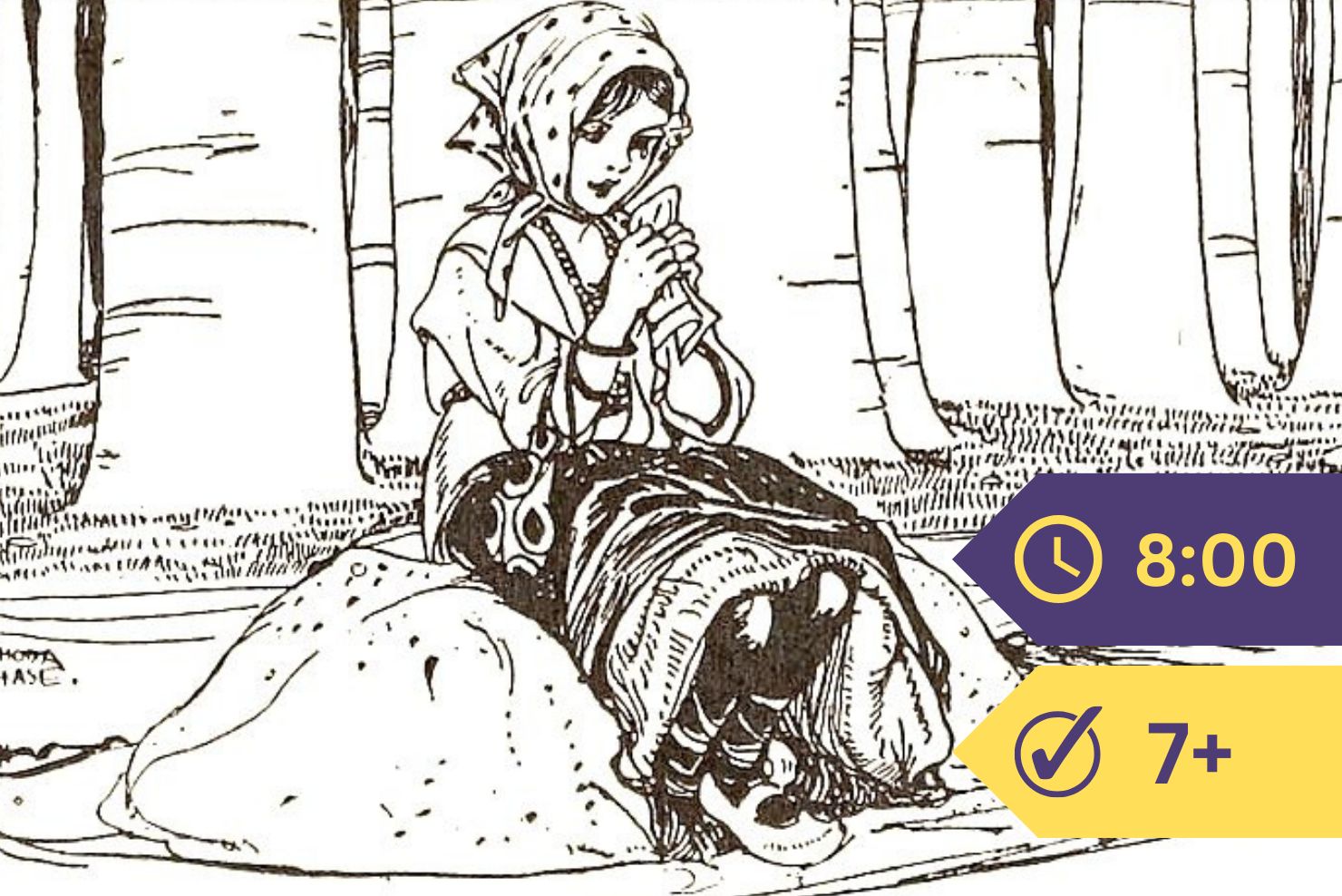Once upon a time in a far-off land there lived by an ocean an ogre and his wife.
Their home was a cave in a big white rock which was so white it shone like a light even in the darkest night, and many a ship had thought it a harbor in a storm and been wrecked by the shore where the ogre lived.
And this was the way he lived, because the ships carried rich cargoes and the ogre lost no time in helping himself to all that he could find, while the sailors were glad to escape in lifeboats when they saw the dreadful-looking ogre, who was so big and strong he could lift a ship.
In the same country, miles and miles away from the ogre’s cave, lived a rich king, who had a son named Roul, and one day while the Prince was out hunting he passed in the woods a cabin where lived a poor girl named Leta.
But while Leta was very poor she was also very pretty, and as the Prince rode past he saw her at the window and raised his plumed hat and smiled.
The next day Prince Roul again rode to the woods and this time he did not pass Leta’s cabin. He stopped his horse in front of her door and asked for a drink of water.
He had thought Leta pretty through the window, but when he beheld her this time he completely lost his heart, and day after day he went to the cottage and talked to pretty Leta.
After a while the King told his son it was time he was looking for a wife, as he wanted to see him married before he died and know that his wife was worthy to be a queen.
So the King gave a feast which lasted for weeks, and princesses from far and near were asked that Prince Roul might choose for himself a wife, for, as I said before, the King was very rich and all the kings in the other countries were anxious, of course, to have Prince Roul for a son-in-law.
But Prince Roul did not choose a wife from among the beautiful princesses, for he was already in love with pretty Leta, and while he knew full well his father would never give his consent to their marriage, he was determined he would wed no one else.
On the last day of the feast the King told him he would have to choose. “You have before you the beautiful women of the land,” said the King. “Make your choice at once, and the wedding shall take place this night.”
“Father, you have not brought to me the most beautiful woman in the world,” replied Prince Roul. “If you had I should have asked her to be my wife before this.”
“What do you mean?” asked the King. “All the princesses in the land are here.”
“Ah yes, that is true,” replied the Prince, “but the most beautiful woman in the world is not a princess, as you think of them, but she is a Princess for all that. Father, she is the Princess of my heart and I cannot marry any other woman.”
Then the King made the Prince tell him who she was that he loved so dearly, and when he learned Leta was a poor girl who lived in the woods close by, he was very angry and told the Prince he should never wed her.
All the beautiful princesses were sent home, and the angry King called his servants to him and commanded that they should go to the woods and find this girl who had upset his plans for his son.
“Find her and chase her out of the woods; drive her into another land where the Prince will never find her,” he told them.
But the King had forgotten one very important thing, and that was his son, for he should have made him a prisoner before he gave such an order. This he did not do, and Prince Roul, who overheard what his father had said, lost no time in jumping on his horse and making his way to the woods ahead of the servants of the King.
“Jump up behind me,” he said to Leta when she came out of the cabin, and away they rode, the feet of Prince Roul’s horse scarcely touching the ground as they fled.
The King’s servants were not long in discovering that the Prince had outwitted them, but they gave chase and away they went through the woods, while poor frightened little Leta clung to the Prince, wondering what it was all about.
On and on they rode, but to Leta clinging to her lover, it seemed they flew over the ground and through the woods. She could see the bright trimmings of the servants’ coats glistening in the sun, and she knew they were gaining on them.
By this time Prince Roul had told her that his father, the King, had tried to make him marry a princess, but that he would marry no one but the girl he loved and that was herself.
When Leta heard this she was more frightened than ever, for she knew now that she was the cause of all this trouble and that the servants must be chasing them to take Roul from her.
Leta put her hand to her breast. Yes; it was there—the little paper with the powder a fairy had given her a long time ago, because Leta had left a beautiful rose on its stem she was about to pick when she discovered a little fairy sleeping inside the rose.
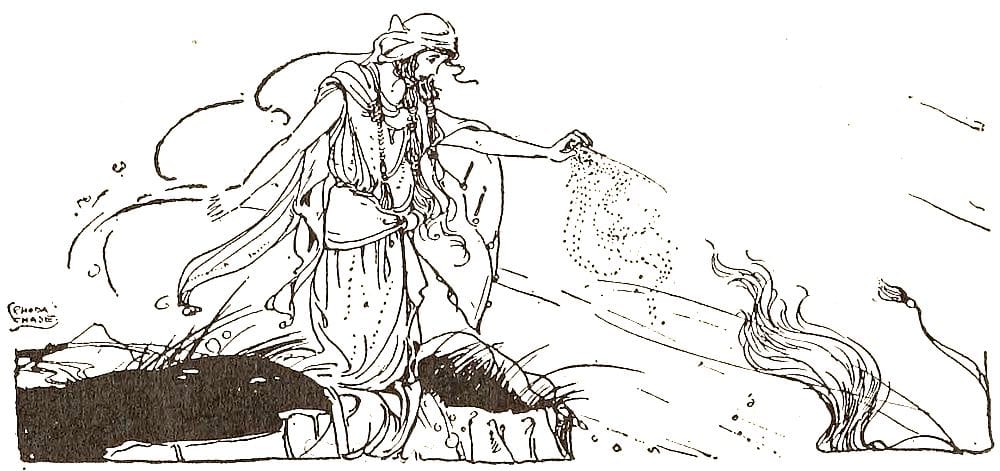
“If you ever are in trouble, open this paper and throw the powder around you,” the fairy had told her. “It will protect you from all harm.”
Leta had never before needed protection, and she was not thinking so much of herself now as of her lover, wondering what the King would do if he did not obey him.
Just then the horse on which they were riding came to a full stop with such force that Leta was thrown to the ground and the next thing she knew over the side of a cliff leaped the horse with the Prince on his back.
The ocean was below, but before the horse and his rider had reached it Leta drew from her dress the magic powder and threw it over the cliff.
“Make the ocean dry,” she screamed as she threw the powder, and, to her surprise, as she threw it over she went, too, and the next instant she stood beside Prince Roul on dry land before a beautiful white castle and the ocean was miles away.
The cliff over which they had gone was the white rock where the ogre and the ogress lived, but when Leta threw the powder she had also summoned the little fairy who had given it to her and she had changed the big white cave into a castle.
When the King’s servants came dashing up to the cliff they saw nothing of the Prince or his horse, and the bottom of the cliff was so far below that they felt sure they had been destroyed, and they rode home to the King with the sad news.
The King’s grief was deep and bitter, for he really loved his son very much, and now when it was too late he cried out that he wished he had let the Prince marry the girl he loved; if only he had him alive that would be all he would ask.
The little fairy did not make herself visible to either Leta or the Prince, but if they could have seen with fairy eyes they would have seen the fairy flying ahead of them into the castle, touching everything with her magic wand as she went.
When Leta entered the door, which was open, for they had called and no one answered, she stood spellbound by what she saw.
The long white marble hall had a floor of silver and marble and the doors were silver also.
The Prince, who was used to beautiful things, was quite surprised at all the splendor, too.
Opening a big silver door, they entered a room hung with silver and deep-blue curtains, and on a silver table Leta saw a big white envelop. When she looked at it she read her own name.
Wondering who could have left it, she opened it and read: “Princess Leta, this is your castle; it is the gift of the fairies who love roses.”
“Your father will not object now to having me for the wife of his son,” she said, with a blush, as she gave the note to the Prince, and then they ran like two happy children through the beautiful castle that had come to them so strangely.
In the deep dungeons under the castle they found all the wealth that the ogre had taken from the ships, and after they had become used to their new home they gave it all to the poor, and so the ogre’s stolen wealth did not help him, and while it could not be given back to those who had lost it, it did much good.
And what became of the old ogre and his wife, you are wondering. I will tell you. When the fairy changed the cave into a castle she changed the ogre and ogress into two big silver statues in the big hall, one at each end, like huge mummies, holding a big light in their hands, which lighted the long hall of the castle.
Then one day Prince Roul and Princess Leta rode away to the palace of the old King, and when he saw his son he wept for joy and hugged him to his heart, and Leta’s pretty face won the old King’s heart at once, so they all lived happily ever after.
But while the old King wanted them to make the palace their home, Prince Roul and Leta could not give up their white castle by the sea, so part of the year they lived in the white castle, and when Prince Roul grew old and his grandchildren begged for a story, the King told them of Prince Roul’s bride and the wonderful leap they took over the cliff which forms the back of the castle.

